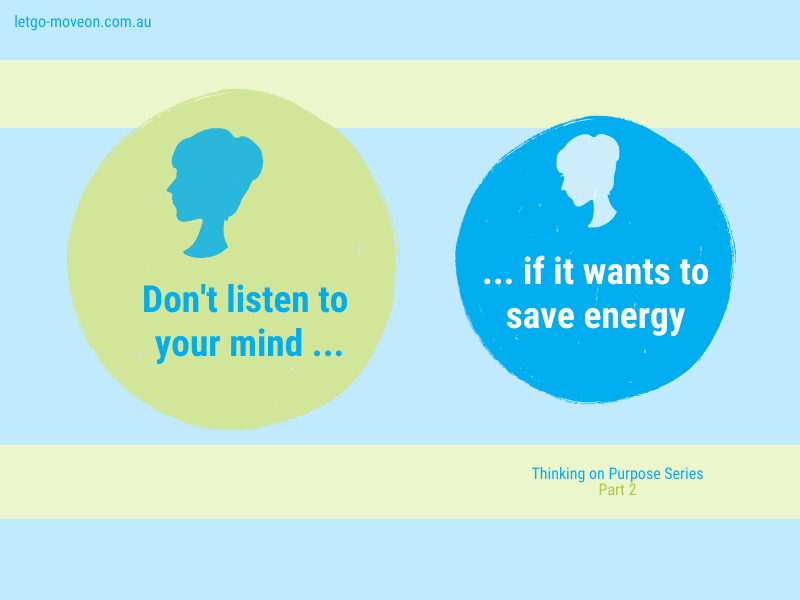Don’t let energy-conserving thoughts get in your way
Our mind’s main interest is to keep us safe and comfortable all the time.
One of its built-in survival instincts is to conserve energy whenever possible.
Thus, when we decide to do something that we assume might be hard or exhausting, our mind’s on-default reaction will be to bring up objecting thoughts.
Our mind automatically overestimates the discomfort involved, underestimates the pleasure and joy we will get from doing the work, and tries to prevent us from spending energy on it.
However, often when our mind brings up the thought that doing something should be avoided because it is too hard and exhausting, the result is actually the opposite:
Instead of feeling tired and exhausted, we feel good and energised and fit and strong as soon as the work is done (and often while doing it).
This is good to know!
We don’t have to listen to our mind all the time
Next time when our brain thinks something is (too) hard to do and tries to make us feel reluctant to do what we decided to do, we can deliberately switch our point of view.
We can decide to focus on the positive results that we expect to get from doing the work. We stop listening to our mind, and we deliberately choose a thought that makes us feel like doing what we wanted to do.
In most cases, we will be glad we did.
Because it feels so good to have positive feelings before we get active and it feels fantastic to experience the positive results which are waiting for us on the other side of the action.
The starting point for all these good feelings, actions and results is a good thought – always.
EXAMPLE
Let’s imagine you made a firm decision to declutter the attic on next Saturday.
You had been postponing this activity for a while.
Now you take the effort to write down your thoughts about it:
‘This is so much work. It will take the whole day and it will be exhausting. There is so much rubbish up there, all that dusty and useless stuff. We should never have bought a house with an attic.’
No wonder that always procrastination had been the winner in this discussion. And now again your mind comes up with
‘No, no, no! This is too hard! It’s a stupid idea to clear up the attic in summer. Let’s do it in winter.’
You tell your mind ‘Stop talking! It’s my turn now!’ and you ask yourself,
‘How would I be thinking about this project if I focused on the positive results?’
Your new thoughts are:
‘It’s really time that we make good use of the attic. It’s so much space and light up there, we might be able to use the attic as a home office. And imagine all the good things that are currently hidden under the clutter. I am really curious what we will find there. This will be fun. And we will celebrate the clean attic with a barbecue party on Saturday evening.’
Are you getting excited now? Energised? Determined to get it done?
NOW LET’S GET REAL.
Think about a project that you have been postponing for a while.
As you now know, you have to expect your mind to object. And that’s o.k., it’s its job.
But this time you decide that you no longer want to listen to your mind’s counter arguments.
Now you are taking the lead:
-
- The first step is to list all the positive results you expect to achieve.
- The second step is to make a plan.
- The third step is to take action.
- And the final step is to enjoy the results of your work.

